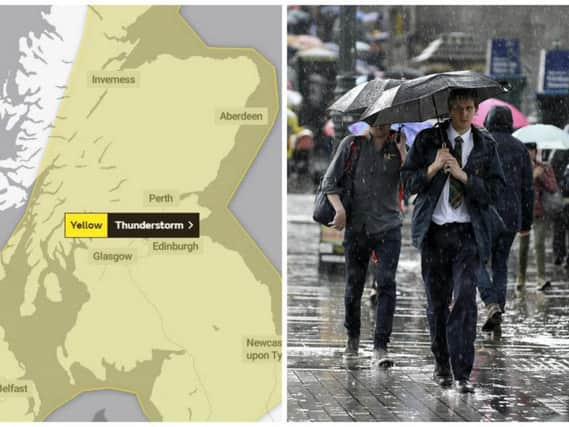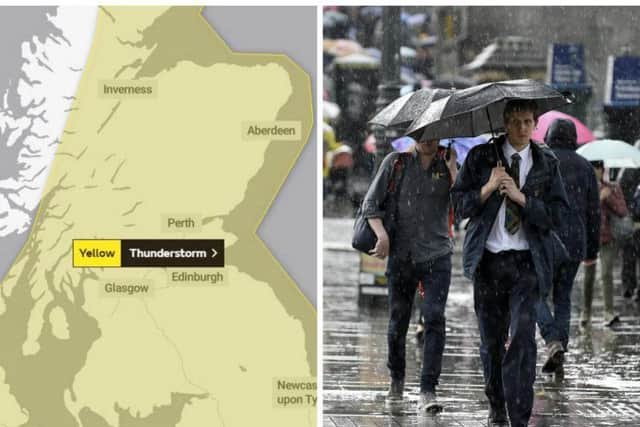Scotland weather warning: Torrential rain set to blast nation over weekend


The alert came as rail engineers cleared landslides and other damage which left five sections of the Scottish network blocked yesterday.
Events abandoned by the torrential rain included the first stage of the inaugural Women’s Tour of Scotland cycling race between Dundee and Dunfermline.
Advertisement
Hide AdAdvertisement
Hide AdOrganisers called it off after two hours because of “impossible conditions” caused by “heavy sections of standing water”.


Some 200 passengers had to be rescued from three trains stranded near Bishopton after overhead power lines were damaged by a fallen tree.
ScotRail sent a rescue train and transferred passengers using step ladders, who were stuck for about three-and-a-half hours.
The incident at 8:20am closed the lines between Glasgow, Gourock and Wemyss Bay for the rest of the day.
One of the passengers, Hayden Sutherland, praised how staff had handled things.
He said: “Staff were profusely apologetic, even though it wasn’t their fault.
“They worked above and beyond the call of duty, and ensured everyone got off the train safely. Everyone was really, really helpful.”
Later, a ScotRail train with 100 passengers on board was able to drive slowly through debris from another landslip on the Glasgow-Mallaig line at Glen Douglas, beside Loch Long, just before 2pm – the third weather damage on the line in five days.
Advertisement
Hide AdAdvertisement
Hide AdScotRail said the driver of the northbound train spotted the landslide ahead and drove through it at 1mph so the passengers could reach Arrochar station rather than have to be taken off the train.
Network Rail Scotland (NRS) tweeted: “Due to a further landslip between Arrochar and Glen Douglas, the southern part of the West Highland Line is currently closed.
“We’ve dispatched specialists to assess the situation and confirm what work is required to reopen the line.”
The Jacobite steam train also struck a tree between Fort William and Mallaig.
NRS said the incident happened at about 12:15pm near Lochailort and the tree was cleared and line re-opened at 1:50pm.
Further south on the route from Glasgow, the section between Ardlui at the northern end of Loch Lomond and Crianlarich will now remain shut until Thursday 22 August after heavy rain damage on Sunday.
The Crianlarich to Oban line is due to re-open on Monday following repairs to separate damage at Tyndrum.
On the roads, surface water caused traffic queues on major routes including around the Queensferry Crossing.
Advertisement
Hide AdAdvertisement
Hide AdConcrete deterioration of the River Almond bridge, thought to be weather-related, forced the closure of one lane of the M9 in Edinburgh.
A fallen tree caused problems for the driver on the A92 in Glenrothes, while strong winds posed a hazard on the A9 Dornoch Bridge.
CalMac cancelled its Gourock-Dunoon ferries and also sailings between Mallaig and Armadale on Skye because of strong winds, with several other west coast routes also disrupted.
The Met Office’s yellow – be aware – severe weather warning for heavy rain remains in force for the whole of Scotland apart from the west Highland and Islands until 6am tomorrow.
A spokeswoman said: “Heavy showers and thunderstorms are expected to develop through Saturday, lasting into the first part of Sunday.
“Whilst many areas will miss the worst of these thundery showers, a few spots could see 15-25mm within an hour and 30-40mm within 3 hours.
“It is possible some of these may become slow-moving and prolonged, most likely across parts of southern Scotland, leading to the potential for 60-80mm (up to 3in) of rain in 6-12 hours.”
The Scottish Environment Protection Agency issued five flood warnings for Bridge of Allan and parts of Tayside and Speyside.
Advertisement
Hide AdAdvertisement
Hide AdNeil Armstrong, chief meteorologist at the Met Office, said: “This low-pressure system will bring challenging conditions, including unseasonably strong winds and heavy rain, from the west during Saturday.
“Summer storms - compared with those in autumn and winter – always have the potential to create additional impacts because more people are likely to be outdoors, especially by the coast.
“Additionally, with trees in full leaf they are more vulnerable to being brought down by strong winds.”